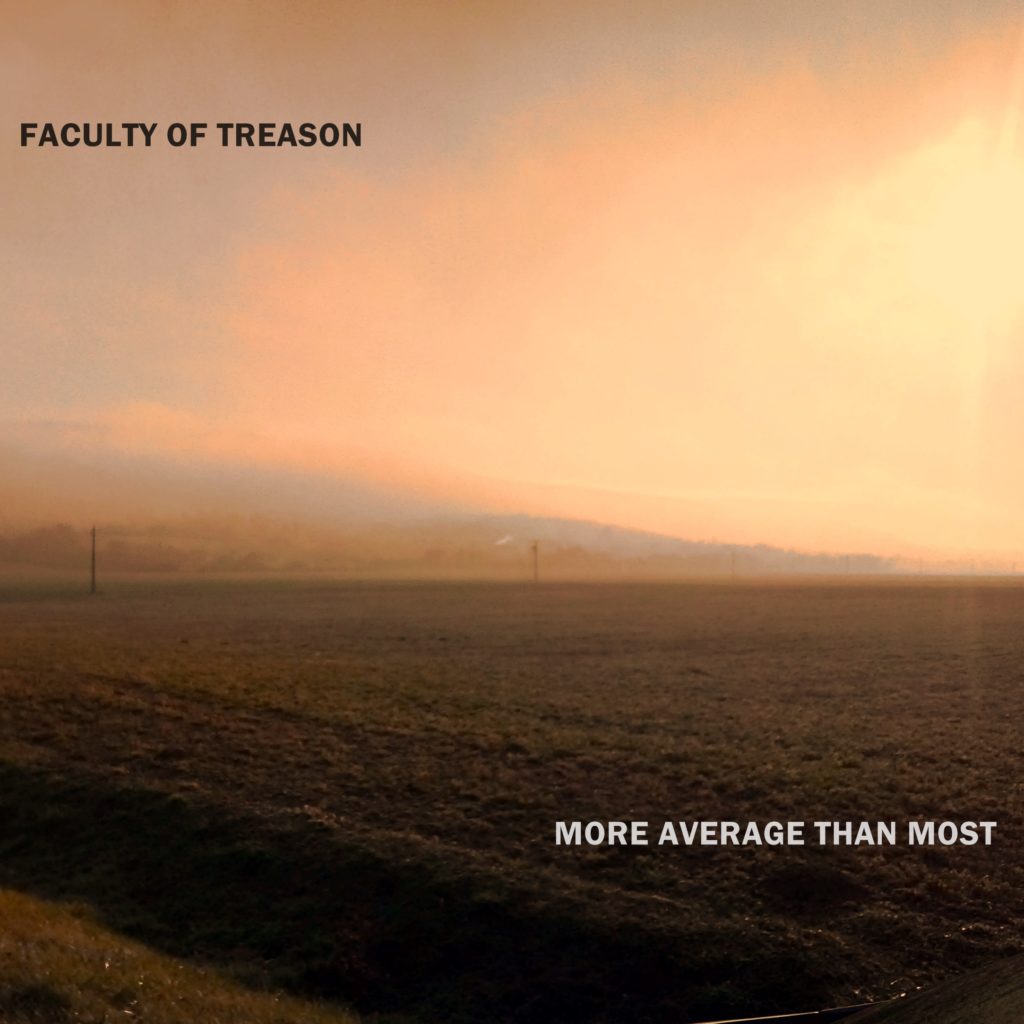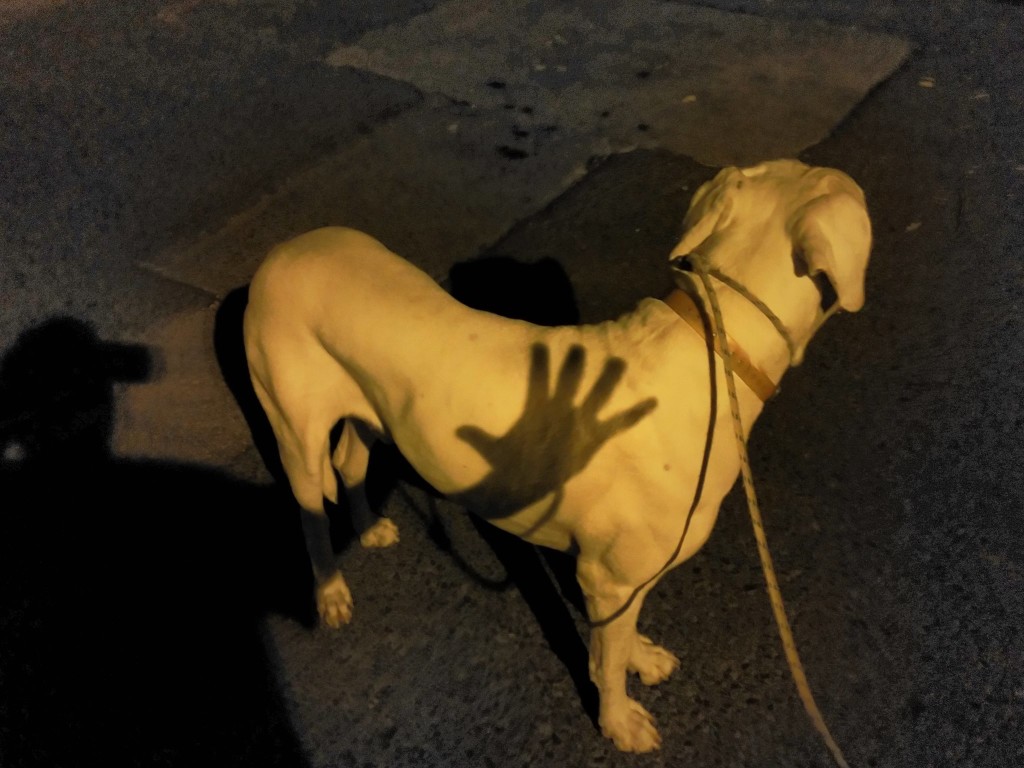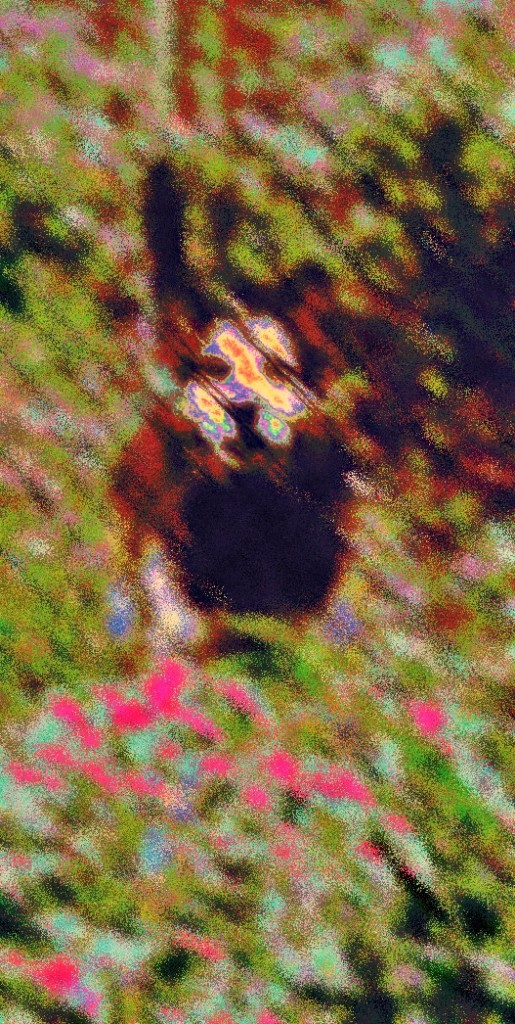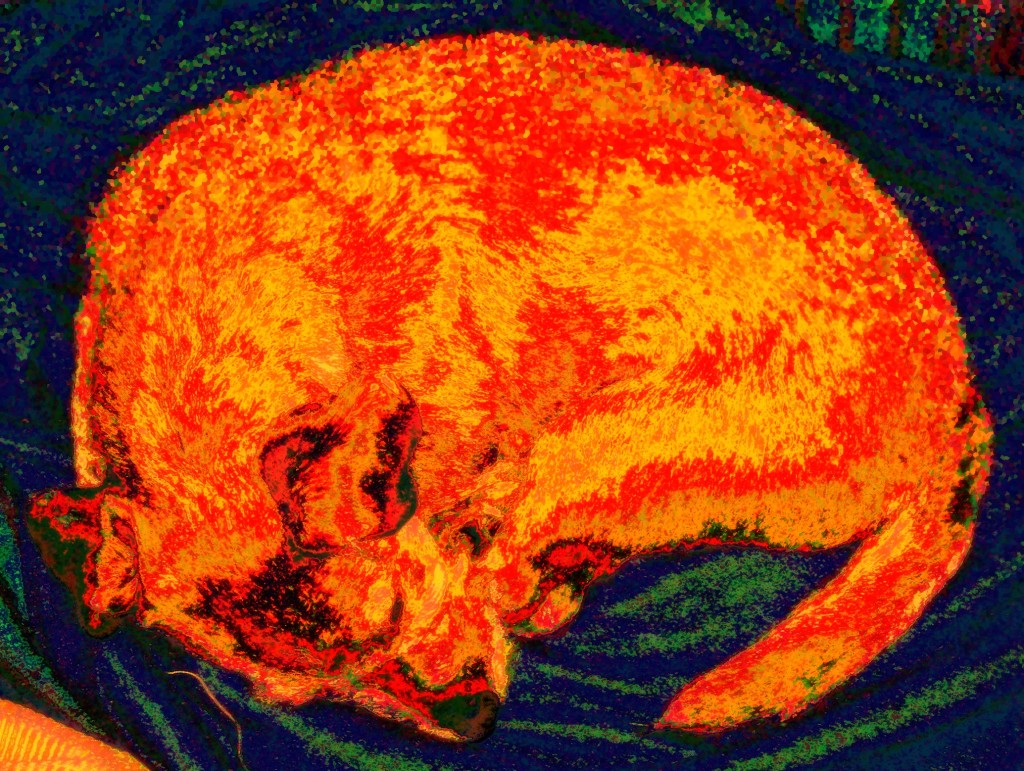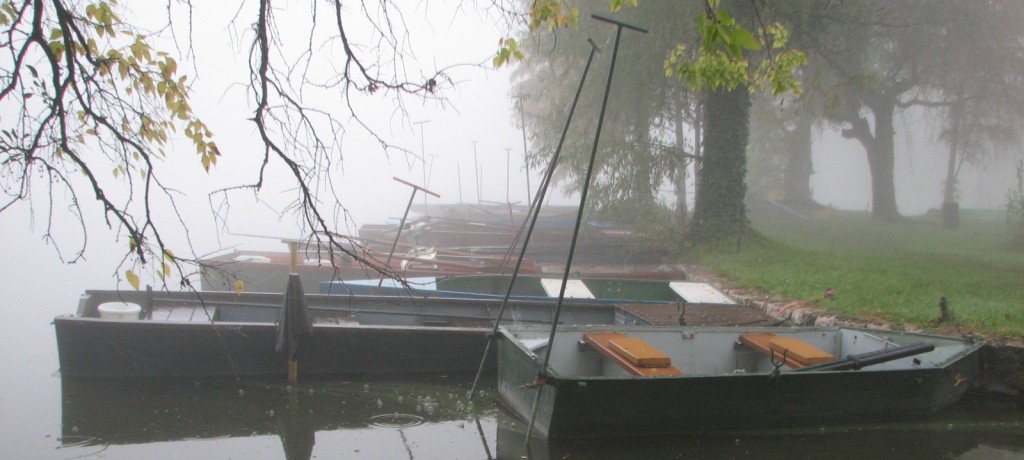íšgy megírni, hogy ne az legyen, hogy azért, hogy az egyébként vélhetően jogos helyeslést és tiszteletet learassam.
íšgy megírni, hogy ne az legyen, hogy most egy kicsit megleckéztetem és kioktatom azokat, akiknek mondjuk ez így azért kicsit túl meredek.
íšgy megírni, hogy ne mismásoljam el a hatalmas nyereséget, amit nekem ez a történet már eddig is hozott, és vélhetően még ezután is fog.
De megírni mégis.
*
Meg nehéz is tudni, hogy egy történet, mint Gestalt, valójában hol kezdődik.
Lehet, hogy ez valójában kicsit mindig esetleges. Mindenesetre elég nehéz egyáltalán elgondolni valamit, aminek nincs – előzménye.
Legyen úgy, hogy négy nappal ezelőtt a feleségem, írd és mond általános főszerelmem és isteni tettestársam, a Verus, valahogy olyan feltűnően rosszkedvű volt. Beszólt nekem apróságok miatt, és félelmek gyötörték, és elégedetlen volt, és nyűgös és… aztán délutánra kibökte,hogy igazából az van, hogy ő kivett a könyvtárból egy könyvet, a Saul fia történetéről, és abban olvasott valamit, amit lehet, hogy nem kellett volna. Én emlékeztettem, hogy én pont az vagyok, aki mindent a világon inkább tudna, mint nem tudna, úgyhogy belekezdett.
Egyik nap Auswitzban egy tizenötéves lány a gázkamrát túlélte. A Sonderesek egy magyar zsidó orvost hívtak oda, ő írta meg a történetet később (Nyiszli Miklós) . Amikor a gáz elindult, a lány valahogy egy nedves sarokba esett, és egy másik ember nedves haja is az arca elé esett, és a ciklon bét a víz semegesíti. A gyengén mozgó testről levették a hullákat, és a orvosi szobába vitték. Az orvos adott neki egy-két injekciót, magához tért. Nagyon ki volt borulva, nem beszélt. A Sonderesek, ki tudja honnan, meleg húslevest hoztak neki, amit megevett, és erőre kapva elmondta a nevét, meg hogy honnan hozták ide a családjával együtt. Ekkorra érkezett meg a krematóriumot felügyelő SS-tiszt. Miután megértette, mi helyzet, ezt mondta: erre nincs megoldás, itt senki nem maradhat életben. Az előtérbe terelte a lányt, és tarkón lőtte.
Aztán valamivel később a facebookon jött az értesítés, hogy Budapesten egy menekülteket fogadó ideiglenes szállás egyik emelete kiégett, 70 ember, 70 menekült maradt szállás nélkül. Segítséget kértek.
Megosztottam a bejegyzést. Próbáltam továbbkattintani, de nem ment.
Vannak ezek a pszichózisközeli pillanatok, ami olyan, mintha az emberben az istenség szólalna meg, miközben csőlátás és furcsa audtív zavarok is előfordulhatnak.
“Ha most még én sem telefonálok”, jutott lassan és kimérten az eszembe, “akkor most ki?”
Telefonáltam. A Menedékesek adtak egy másik számot, hogy a baptista szeretetszolgálatnál keressem ezt és ezt. Kerestem. Megköszönte a jelentkezést, kicsit kérdezgetett, és mondta, hogy majd keresnek.
Tegnap este érkezett meg hozzánk egy ember és a fia.
Ez a férfi valahogy egy olyan bácsi, bár gyanítom, hogy fiatalabb nálam (közben kiderült, négy évvel fiatalabb). 140 centi, kicsit pocakos, kicsit ősz, teherbíró. Nincs közös nyelvünk, bár egyszerű témákban érti kicsit a magyart. Láthatóan semmiben sem akar a terhünkre lenni, most épp nekiállt főzni a fiára és magára. Hozott két krumplit meg egy hagymát, és teljes főzőfelszerelést. Szerencsére a fiú tud magyarul, ügyesen fordít az apjának. íllítása szerint kilencéves, bár a menedékesek szerint csak hét. Látszik rajta , hogy önhibáján kívül hirtelen fel kellett nőnie.
Vera ugyan tettemet nemeslelkűnek, ugyanakkor elhamarkodottnak érezte. Mi bérlakásban élünk, és nem szóltunk a tulajdonosnak. Vajon mit szól ehhez ő?
Felhívtam. Elég regényes módon kerültünk mi ide (az egy másik sztori), és nem vadidegen: jó sok évvel ezelőtt egy hosszabb önismereti csoporton együtt voltak Verával. Amikor elmondtam neki, hogy mi történt, éreztem, hogy kicsit formálisba vált, és gondolkodási időt kért.
Negyed órával később visszahívott, és elmondta, hogy szerinte köztünk van valami mély, világnézeti eltérés, amiről ő szívesen beszélgetne is akár, de az persze nem telefontéma, ellenben értsem meg, hogy az ő külföldi zsidó rokonai most éppen az arabok által kialakított helyzet miatt kényszerülnek elköltözni, és talán az ő nagybátyja, aki szintén külföldön él, és akinek ez valójában a lakása, sem örülne neki, ha megtudná, hogy a lakásába afgán muszlimok költöztek. Én őszintén bocsánatot kértem a kész helyzetért, biztosítottam róla, hogy a szempontjait tökéletesen megértem, és rákérdeztem, hogy konkrétan mi legyen akkor. Mert hogy természetesen teljesen oké az is, ha ő azt mondja, hogy menjenek el, én ennek a következményeit kész vagyok viselni, de mondja meg. Azt mondta, azt szeretné, ha tényleg csak két hétig maradnának, de persze ha nincs más megoldás és három hét lesz belőle, az még belefér.
í–t perccel később még visszahívott, hogy azt is szeretné, hogy ne kapjanak kulcsot és ne hagyjuk őket egyedül a lakásban.
Felhívtam a lányt a Menedéktől, megértő volt, vette az adást. Amikor többedszerre is hálálkodni kezdett, már annyira kényelmetlenül éreztem magam tőle, hogy megkértem, a hálálkodást tekintsük befejezettnek, mi rendes emberek vagyunk, így ez természetes dolog, és ha sokmindenkinek nem az, az az ő dolguk. Megkönnyebbülve nevetgéltünk egyet és elbúcsúztunk.
A mi családjaink sajnos elzárkóztak attól, hogy a 24-i és a 26-i karácsonyi ebédekre magunkkal vigyük újdonsült lakótársainkat. Persze könnyen lehet, hogy ők nem is akarnának jönni. Nem egész huszonnégy óra alatt is jelentős mennyiségű giccses romantikus előítélet hámlott le rólam. Nem kizárt, de nem is lehet elvárás, hogy itt most örök barátságok szövődjenek, lehet, hogy elmeséljük majd egymásnak valahogy az életünket, de most inkább úgy fest, hogy nem lesz ilyen. Nem fogadják el az ennivalónkat (csak a fiú a cukorkát Lizától). í–reg barátom, aki ráadásul az utóbbi években vallásos izraelita identitást épített, vállalta a két bébiszittelést, és izgatottan telefonálgatni kezdett. Amikor visszahívott, hogy webcímet meg telefonszámot kérjen, ránéztem a Menedék oldalára, és láttam, hogy mindenkit sikerült elhelyezni. Rosszfej a magyar, önző, félős, és nem valami barátságos többnyire, de azért a helyzet annyira nem rossz.
Közben az afgán kisfiú és a mi hétéves Lizánk nagy játszótársak lettek. Drónoztak, tűzfiú és vízlányoztak, most videókameráznak együtt.

A levesből kaptunk kóstolót: a krumpli és a hagyma mellé még kínaileves-tészta került, hagymás paprikás alapon főzte meg. Magyaros, krumplistészta-leves. Víg íœnnepet.
Frissítés: minthogy Liza és új barátja délután versenyt köhögtek és torokfájásra panaszkodtak, kakukkfüves inhalálást javasoltam, amit elfogadtak. A két gyerek együtt inhalált.
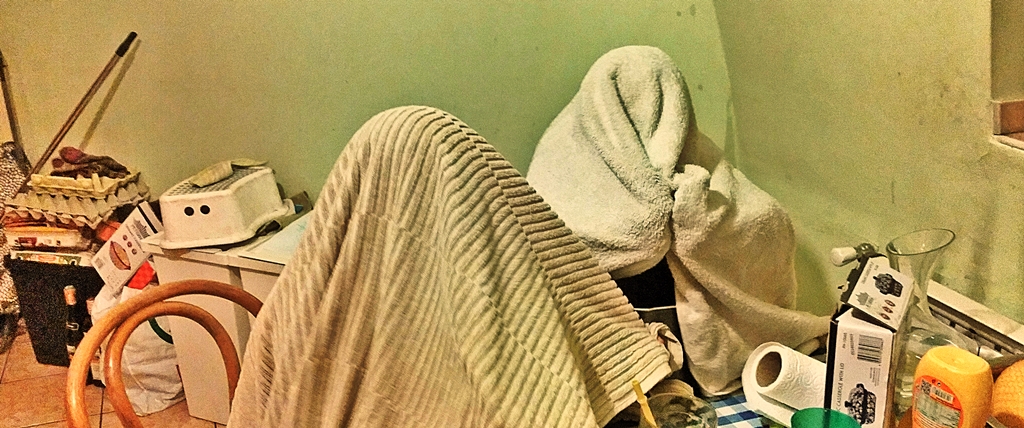
Lehet tippelni, melyik az afgán fiú. melyik a magyar lány. ( :
**************************************************************
*********************** ENGLISH HERE ***********************
**************************************************************
Write it so it is not in order to harvest the otherwise actually quite well-deserved approval and respect.
Write it so it is not me giving a bit of a lesson and talking down to those tho whom this is just a little bit too steep.
Write it so I don’t forget to mention the tremendous benefit that this story has already had in my life, and I expect it to keep doing so.
But to write it, anyway.
*
It is also difficult to know where a story, as a Gestalt, really begins.
Perhaps it is always somewhat arbitrary. At any rate, it is quite hard to even try to get your head around anything that doesn’t actually have – preceedings.
Let me start by recalling that four days ago my wive, that is to say my general main love and my divine accomplice, Verus, was somehow in a really foul mood, quite clearly. She was rude to me about little things and she was filled with dread and she was dissatisfied and kind of petulant… and then in the afternoon she suddenly said that in actual fact when she had gone to the library with the kids she also got a book for herself, a book about the making ot Saul’s Son, in which she had then read something she perhaps shouldn’t have. And I reminded her that I was actually exactly the guy who would prefer to know anything the world rather than not, so she started off.
One day in Auswitz, a 15-year-old girl survived the gas chamber. The Sonders brought a Hungarian Jewish doctor, who wrote the story down in his book later (Miklós Nyiszli). When the gas was introduced, the girl somehow fell in a damp corner, and the wet hair of another person fell on her face, and water neutralises Cyclone B to some extent. The corpses were taken off the weakly moving body and she was taken to a medical room. The doctor gave her a few shots, and she came to herself. She was obviously badly shaken and refused to speak. The Sonders, god knows from where, got her some meat broth. She ate that, and as she felt better she told them her name and the name of the town where she had been brought from with her entire family. By that time, the SS Officer in charge of the crematorium arrived. When he understood what had happened, he said: there is no solution for this, nobody may survive here. She walked to girl to the antechamber and shot her in the head.
And then a little later there was on Facebook this post, about a “temporary accommodation” facility for refugees burning down, and 70 people, 70 refugees losing the roof over their heads. They were asking for help.
I shared to post. I tried to click on something else, but I couldn’t.
There are these weird moments quite close to psychosis, which are like the voice divine speaking in us, while there is this weird tunnel vision and weird auditive distortions occur.
“If even I don’t phone this number now”, I thought to myself slowly and articulating clearly, “then who will?”
I made the phonecall. The People at this organisation Shelter gave me another phone number, on which I talked to someone from the Baptist Charity Organisation. He was happy to hear from me, asked a few questions, then said they’d be in touch.
A man and his son arrived to come live with us last night.
The man is like an uncle, although I suspect he is younger than me (edit: he is 4 years younger). He’s 140 cms tall, with a little pot-belly, greying around the edges, obviously durable. We have no language in common, although he can follow some very simple Hungarian. It is very clear that he wished to avoid being an imposition as much as possible, just now he has started cooking for his son and himself. He brought two potatoes and an onion to the kitchen, and a full set of kooking utensils and implements. Luckily, the boy speaks quite good Hungarian, and he translates well for his dad. He claims he’s nine, though the women at shelter said he was 7. He’s the kind of kid you can see suddenly had to mature to near adulthood through no fault of his own.
Vera thought my actions had been well meant but rash. We live in a rented flat, and we have not told the owner. What does he say?
I called him. The way we ended up where we live now is another fascinating story, anyway, the landlord’s not a stanger, some years ago he had been on a course with Vera. When I told him what had happened he clearly switched to a somewhat more formal mode of speech, then asked for time to consider.
He called me back fifteen minutes later and told me he felt there were some deep differences in world-view and values between us, which he would be glad to have a chat about in person, though not on the phone, but on the other hand he wished me to understand that some relatives of his living in another country had just had to move because of the unwholesome situation that the arabs had caused where they lived, and perhaps his uncle, who is the actual owner of the flat and whom he really only represents towards us, who also lives abroad, would not be necessarily very happy to learn that some muslims from Afghanistan had moved into his flat. So I honestly sought his forgiveness and acknowledged the error of my ways in full, and I assured him that I fully understood his perspectives, and asked what he felt would be the correct action to take to proceed now. Because, naturally, I was fully okay with having to call the refugee-helpers again and asked them to find another place for this father-son duo, I was ready to take the consequences of that on board, but he should call it. So he said he’d like them to really only stay for two weeks, but of course if for an unavoidable reason that ends of being three weeks, that’s still alright. But not more.
Five minutes later he called back to say he would also like us to understand that we were not to give any keys to our visitors, and that we should never leave them alone in the flat.
I called the girl from Shelter, she was understanding, she followed what I was saying. When she started saying thanks for the nth time, it made me feel so awkward, I just asked her to let’s consider the giving thanks part to be done, we are decent people, and this is a natural thing, and if it’s not natural to many people, that’s up to them. So the mood ligthened, we laughed a little together and said goodbye.
Sadly, both our families rejected the notion or receiving our new cohabitants at the two different Christmas dinners on the 24th and the 26th. Although, quite probably, they would not accept the invitation anyway. In less than 24 hours, I have lost a number of veneers made of romantic, silly and kitchy prejudices. It is not out of the question, but it is not actually a requirement of our time together that we forge eternal friendships, and while it is possible that we will tell each other our life stories, the way it looks right now, it’s more likely that will not happen. They do not accept our food (although the boy accepted candy from Liza). My old friend, who has in recent years built himself something of an identity as an observant of Judaism, , has agreed to babysit on both occasions, and started phoning people excitedly to find accommodation for more of the victims of the fire. When he called me back to get a website address or a phone number I looked at the Facebook page of Shelter and I saw that they had already managed to find temporary places for everyone. So, though to some extent it is true that Hungarians are arseholes and generally selfish, fearful and not very friendly mostly, the situation is not as bad as it may seem.
In the meantime, the afghani little boy and our seven-year-old Liza became great playmates. They played with Liza’s drone, then played watergirl-fireboy on the computer, right now, they are playing with the video camera.

We got a taste of the soup: along with the potatoes and the onion, there was some Chinese noodles from a packet of soup in it, cooked after frying up the onions and the potatoes in oil, adding some paprika. It was really a possible Hungarian dish, potato-and-pasta soup. Have a Happy Holiday.
Update: as Liza and her new friend had on ongoing coughing competition all afternoon, and complained of sore throats, I suggested inhaling the vapours of a strong thyme tea, which they accepted. They did it together.

So which is the Hungarian girl and which the Afghani boy? ( :



